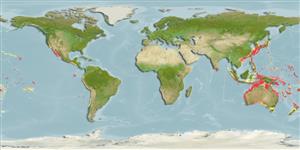Environment: milieu / climate zone / depth range / distribution range
Ecologie
marien benthopelagisch; diepte 50 - 200 m (Ref. 11230). Subtropical
Southeastern Indian Ocean, western Pacific, antitropical.
Grootte / Gewicht / Leeftijd
Maturity: Lm ? range ? - ? cm
Max length : 35.0 cm TL mannelijk / geslacht onbekend; (Ref. 9137); 25.0 cm TL (female)
Dorsale stekels (totaal) : 10; Dorsale zachte stralen (totaal) : 19 - 21; Anale stekels: 3; Anale zachte stralen: 7 - 8; Wervels: 26. Orange-red with black spots on the base of the dorsal fin (Ref. 43805). Congruent rays of the dorsal fin and a caudal fin rounded at the end, without a deep median notch, with only slight notches above and below in males, and with a very weak median notch in females (Ref. 43805).
Occurs inshore near reefs (Ref. 7300), on sand or rock bottom (Ref. 11230). Benthic and benthopelagic on hard substrates (Ref. 58302). Consumed as food (Ref. 559).
Levenscyclus en paargedrag
Maturities | Voortplanting | Spawnings | Egg(s) | Fecundities | Larven
Kharin, V.Y. and V.A. Dudarev, 1983. A new species of the genus Caprodon Temminck et Schlegel, 1843 (Serranidae) and some remarks on the composition of the genus. J. Ichthyol. 23(1):20-25. (Ref. 43805)
Status op de Rode Lijst van het IUCN (Ref. 130435)
Gevaar voor de mens
Harmless
Gebruik door de mens
Visserij: commercieel
Tools
Speciale rapporten
Download XML
Internetbronnen
Estimates based on models
Preferred temperature (Ref.
123201): 14.5 - 27.6, mean 23.3 °C (based on 380 cells).
Fylogenetische diversiteitsindex (Ref.
82804): PD
50 = 0.6250 [Uniqueness, from 0.5 = low to 2.0 = high].
Trofisch niveau (Ref.
69278): 3.4 ±0.45 se; based on food items.
Weerstandsvermogen (Ref.
120179): Gemiddeld, minimale populatieverdubbelingstijd 1,4-4,4 jaar (Preliminary K or Fecundity.).
Fishing Vulnerability (Ref.
59153): Low vulnerability (25 of 100).
